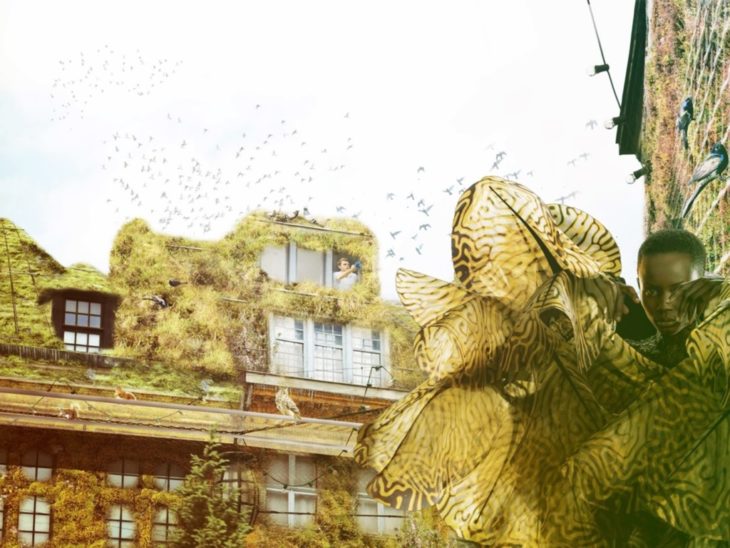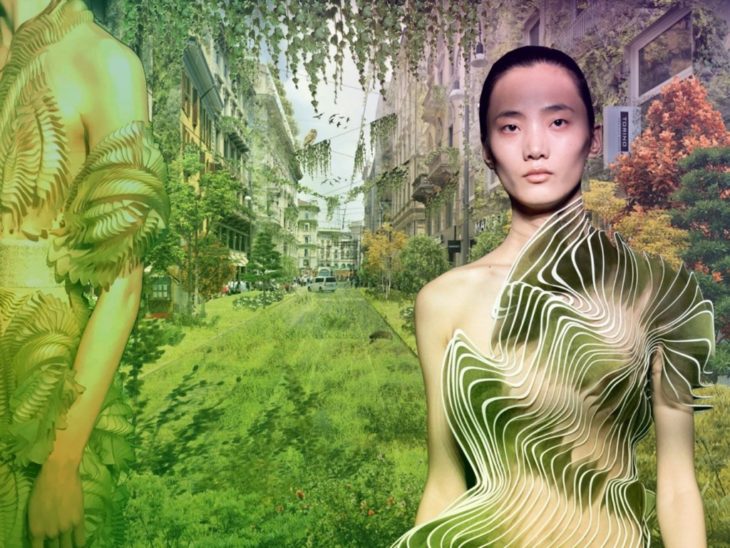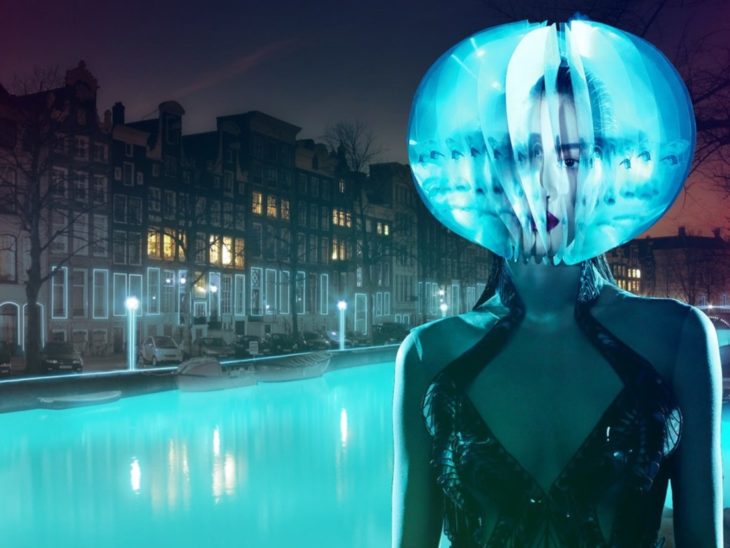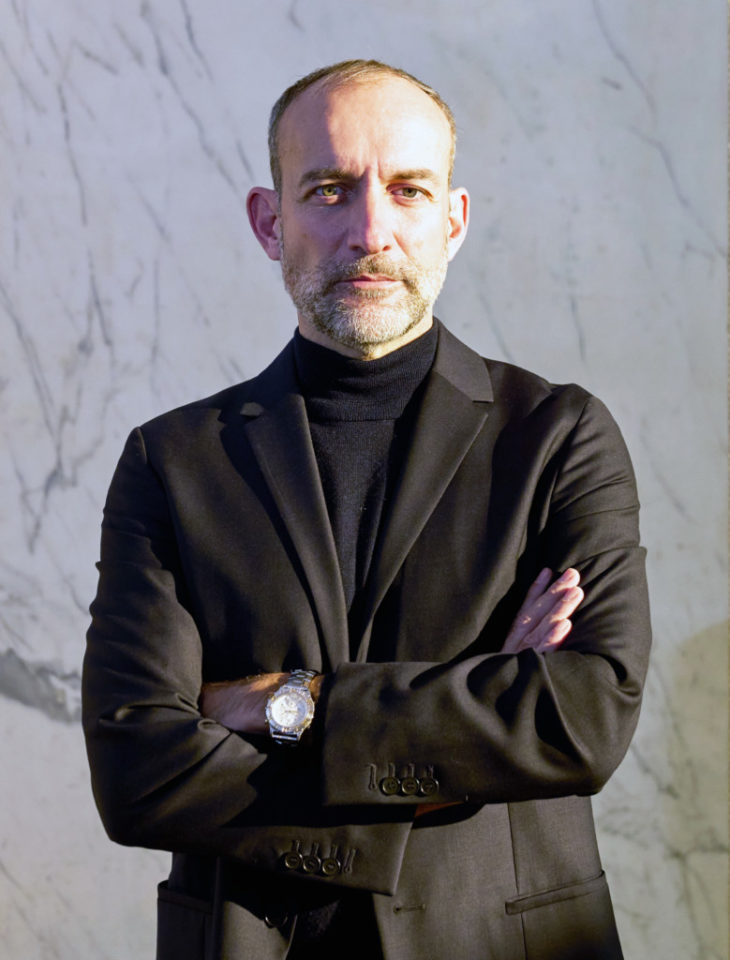Master in City & Technology 2021/22 – Term II
Workshop Name: Urban Ecology – Every(body) is Urbanism / Nature, City, Couture
Total Hours: 36 hours
Faculty: Winy Maas (Professor), Javier Arpa (Coordinator), Adrien Ravon (Teacher), Lex te Loo (Teacher Assistant)

Every(body) is urbanism, by the Why Factory.
Syllabus
The Why Factory, together with artist and haute-couture designer Iris van Herpen, launches Every(body) is urbanism, a research that explores the crossovers between biodiversity, clothing and the city.
Every(body) is urbanism operates at the intersection of nature, urbanism, architecture and the human body. The workshop will be part of a larger project, the Green Metropolis, an initiative launched by the Naturalis Biodiversity Center in the Netherlands. The Green Metropolis is aimed at producing real solutions to tackle planetary urgencies by focusing on the capacity of nature to contribute to the fabrication of a more sustainable built environment. The Green Metropolis will include a traveling exhibition that will display dresses designed by Iris van Herpen, proposals for the city of the future by the Why Factory and natural objects, which will all blend together to form a series of ‘inclusive ecosystems’.
The goal of the workshop Every(body) is urbanism to be developed at MaCT, IAAC is to generate pioneer ideas for the abovementioned ‘ecosystems’: calculations and visualizations of a versatile mix of fashion, heritage, urbanism and biodiversity. We will design and produce diverse spatial installations, audio-visual presentations and other display formats to establish relationships between the urban and the body.

Every(body) is urbanism, by the Why Factory.
Learning Objectives
At course completion the student will:
– be familiar with operating at the intersection of nature, urban design & architecture and haute couture
– be able to produce data related to the impact of reimagining de city of the future through the lens of nature, and their corresponding visualizations
– acknowledge the importance and the necessity of the dissemination of design ideas amongst broader audiences
– be capable of working together with a large team in the production of a collective research.
– Collective research is at the core of the Why Factory’s methodology. Students will be encouraged to work together and to deliver one single collective presentation at the end of the workshop.
– the Why Factory workshops are meant to be open-ended explorations. Students will learn to change course in a flexible manner during the workshop period, as new discoveries are made.

Every(body) is urbanism, by the Why Factory.
Faculty
About the Why Factory
The Why Factory is a global think-tank and research institute, based at the Faculty of Architecture and the Built Environment (Delft University of Technology) and led by professor Winy Maas, co-founder of the architecture and urbanism practice MVRDV. The Why Factory’s Future Cities Research Programme explores possibilities for the development of future cities by focusing on the production of models and visualizations. The results of this research programme are being presented in a series of books—the Future Cities series— published in association with nai010 Publishers in Rotterdam. For more information see: www.thewhyfactory.com

Winy Maas: The ‘M’ of MVRDV, Founding Partner and Principal Architect Winy Maas Ir. Ing (Schijndel, NL – 1959), has received international acclaim for his broad range of urban planning and building projects, across all typologies and scales. These are often self-generated, innovative, experimental, and theoretical. Maas challenges colleagues, clients, as well as students and collaborators at TU Delft’s The Why Factory – an internationally engaged think tank Maas established in 2008 – to challenge the boundaries of established standards to produce solutions that reimagine how we live, work, and play. Aside from his dedicated leadership role at MVRDV and professorship at TU Delft and elsewhere, Maas is widely published, actively engaged in the advancement of the design profession, and sits on numerous boards and juries, including the Spatial Quality Boards of Rotterdam, Eindhoven, and Barcelona.
“I advocate denser, greener, more attractive and livable cities, with an approach to design that centres around user-defined, innovative, and sustainable ideas for the built environment, regardless of typology or scale.” – Winy Maas

Javier Arpa Fernández is an architecture and urbanism teacher, researcher, author and curator. Having completed a Master of Science in Architecture at the Delft University of Technology, Javier specializes in the dissemination of architectural and urbanism practice. Javier is the Research and Education Coordinator of The Why Factory. Javier also holds a position of lecturer at the University of Pennsylvania. He is the Curator of Public Programs at the Faculty of Architecture of TU Delft and Editor-In-Chief at the architecture firm MVRDV. Javier gives public lectures and participates in colloquia worldwide. Javier has been Design Critic at Harvard GSD, Adjunct Professor at Columbia GSAPP, Visiting Professor at ENSA-Belleville and ENSA-Versailles, and lecturer at IE University. He was Deputy Editor of Domus Magazine and Senior Editor for a+t research group. He is the co-author of a+t’s Density, Hybrids, Civ

Adrien Ravon is an architect and academic. In September 2011, he joined The Why Factory, where he has participated in research and education projects, been responsible of the production of digital design tools and actively collaborated in the public dissemination of ideas about the city of the future. He co-authored The Why Factory’s Future Cities Series publications ‘Barba, Living in a Fully Adaptable Environment’ (2015), ‘Copy Paste, the Badass Copy Guide’ (2017), ‘PoroCity, Opening up Solidity’ (2019), ‘(w)ego, Dream Homes in Density’ (2020), ‘ Le Grand Puzzle, Manifesta 13 Marseille’ (2020). Currently, he is working on the publication ‘Green Dip, covering the city with a forest’. He has collaborated with numerous international institutions, including ETH (Zurich), KTH (Stockholm), GSAPP (New York), IAAC (Barcelona), Design Indaba (Cape Town), Centre Pompidou (Paris), Dutch Design Week (Eindhoven), Manifesta 13 (Marseille), or Mori Art Museum (Tokyo). Adrien has worked as an architect and consultant for firms in Argentina, France, and the Netherlands. He is currently a scientific council member for the Franco-Dutch network for higher education and research.

Lex te Loo: After graduating Cum Laude from the Technical University of Delft in 2016 Lex te Loo joined Barcode Architects, where he worked on architecture competitions and later as a parametric consultant. From 2017 onward, he joined The Why Factory where has been teaching the design studios at the TU Delft and workshops at IAAC, GSAPP, ITMO, Manifesta and others. Furthermore, he has conducted research in topics such as The New Old, Sky City, Pixel Planet and The Green Dip. Lex te Loo is assisting the Public Programs of the faculty of Architecture in Delft and organizes the BK Talks and BK Exphibitions.
